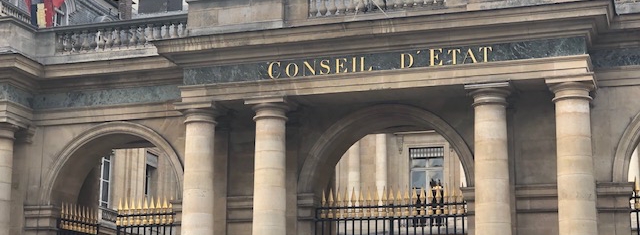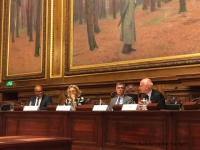Politics
THE COUNCIL OF STATE PUBLISHES 2020 ANNUAL STUDY ON EVALUATION OF PUBLIC POLICY
REAL TOOL FOR DEMOCRATIC DEBATE&DECISION

Council of State Facade (Source: Jedi Foster & Rahma Sophia Rachdi)
USPA NEWS -
The French State Council, in addition to adjudicating disputes between citizens and the administration and rendering independent legal opinions to the Government and Parliament, the Council of State has a third mission: to participate in the debate of ideas and make proposals in the field of public policies.
It ensures this mission through its studies, conferences and reports. A press conference was organized by the Council of State in its historic building, at the Palais Royal, on September 3 at 9 a.m., meeting, in the presence of Bruno Lasserre, vice-president of the Council of State to discuss the results of the assessments of public policies conducted in France, as well as proposals from the Council of State to better conduct and share them. The debate makes it possible to better define the contours of the evaluation of public policies has aroused growing interest for several years, because it makes it possible to know whether a policy achieves its objectives and to understand why, In a context of social and health crises, and citizen mistrust, evaluation can play a central role in our democracy. We publish this study further the press conference of September 3
It ensures this mission through its studies, conferences and reports. A press conference was organized by the Council of State in its historic building, at the Palais Royal, on September 3 at 9 a.m., meeting, in the presence of Bruno Lasserre, vice-president of the Council of State to discuss the results of the assessments of public policies conducted in France, as well as proposals from the Council of State to better conduct and share them. The debate makes it possible to better define the contours of the evaluation of public policies has aroused growing interest for several years, because it makes it possible to know whether a policy achieves its objectives and to understand why, In a context of social and health crises, and citizen mistrust, evaluation can play a central role in our democracy. We publish this study further the press conference of September 3
EVALUATE PUBLIC POLICIES : A REAL TOOL FOR DEMOCRATIC DEBATE AND DECISION-MAKING
COUNCIL OF STATE ´S ANNUAL STUDY 2020-----------------------------------------------------------------------------------------
In a context of mistrust between citizens and public officials, the evaluation of public policies can play a central role, by providing our democracy with reliable and factual analyzes to inform public debate and decision-making. In the study it is publishing today, the Council of State takes stock of evaluation in France: it has progressed a lot, but still remains too far removed from the world of research and sometimes suffers from organizational weaknesses. . Above all, it is not shared enough with citizens and used by decision-makers. This is why the Council of State is now formulating 20 proposals to give itself the means and the ambition to better evaluate, strengthen the virtuous cycle of evaluation and actually use evaluations in democratic deliberation and public action. . Applicable to policies of all kinds, both local and national, the evaluation makes it possible to predict their impact upstream (ex ante), to adjust them during their implementation (in itinere) and to determine their 'they should be continued, abandoned or corrected at their end (ex post). In the face of citizen mistrust, evaluation can help improve the quality of public debate and restore the legitimacy of public action, by basing discussions and choices on facts and analyzes. If the evaluation of public policies is arousing growing interest today, it is because the major challenges that we must face collectively (ecology, health security, aging of the population, etc.) call for political responses more than ever based on scientific work.
SOME PROGRESS YET STILL GAPS-------------------------------------------------------------------------------------------------------
The Council of State's study identifies numerous advances in the conduct of evaluations, made possible in particular by the remarkable advances in open data and secure access to data. However, if more than 2,600 evaluations were carried out between 2007 and 2017, the study observes that they suffer from recurring weaknesses and are not yet truly a tool for debate and decision-making in France.The evaluation of public policies involves multiple competent but insufficiently structured actors, which leads in particular to compartmentalization in the programming and execution of their work. In addition, if links with the world of research are developing, evaluation remains more institutional than abroad and relies less on academic work.-----------------------------------
The study also identifies various recurring weaknesses in the evaluations of public policies carried out to date: the anticipation and the means are sometimes insufficient, the methodology followed does not always ensure the validity of the diagnoses and the association of citizens to the during the implementation of assessments is still rare.-----------------------------
The Council of State also regrets that certain areas of public action remain little evaluated (justice and security in particular), as do certain major reforms or emblematic measures. Finally, the publicity of the results of the evaluations remains insufficient (45% between 2007 and 2017) and the work is insufficiently taken into account by the decision makers.
20 PROPOSALS TO BETTER EVALUATE AND SHARE POLICIES
The Council of State distinguishes 3 priorities, to strengthen the synergies between administration and research, to better program the evaluative work, to guarantee their credibility with citizens and to draw from them useful elements for deliberation and public action.------------------------------------------------------------------------------------------------------------------
The first priority identified by the study by the Council of State is to give ourselves the means and the ambition to better assess. This is why it recommends developing the Parliament's evaluation commissions, making it a mediator between experts and citizens. Public policies that are very costly or have effects on a large number of people deserve to be evaluated as a priority, by an evaluation community structured as a network and calling on evaluators and diversified methods.
The second area for improvement concerns the conditions for carrying out evaluations, which must be steered by collegial and pluralist steering structures, by preventing conflicts of interest, and by involving citizens as often as possible.
Finally, the Council of State insists on the need to use evaluations in democratic deliberation and public action, in particular by publishing and disseminating all the results of the evaluations in a short time and by formulating accessible conclusions and recommendations. to all. Systematic monitoring of actions implemented following recommendations from evaluations must also be put in place. More generally, the evaluation must also be part of the long term (evaluation cycles on very long-term policies, development of the use of experimentation, etc.) by capitalizing on the lessons it brings to prepare for the future.Source: Council of State, Press conference at COUncil of State on Sept 3
Liability for this article lies with the author, who also holds the copyright. Editorial content from USPA may be quoted on other websites as long as the quote comprises no more than 5% of the entire text, is marked as such and the source is named (via hyperlink).












